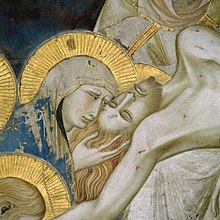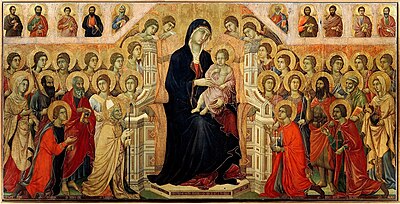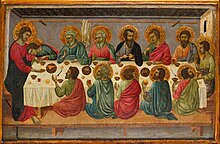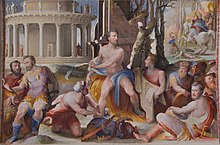Sienese school

The Sienese School of painting flourished in Siena, Italy, between the 13th and 15th centuries. Its most important artists include Duccio, whose work shows Byzantine influence, his pupil Simone Martini, the brothers Pietro and Ambrogio Lorenzetti and Domenico and Taddeo di Bartolo, Sassetta, and Matteo di Giovanni.
History

Duccio may be considered the "father of Sienese painting".[1] The brothers Pietro and Ambrogio Lorenzetti were "responsible for a crucial development in Sienese art, moving from the tradition inherited from Duccio towards a Gothic style, incorporating the innovations in Florence introduced by Giotto and Arnolfo di Cambio".[2]
"Sienese art flourished even when Siena itself had begun to decline economically and politically. And while the artists of 15th-century Siena did not enjoy the widespread patronage and respect that their 14th-century ancestors had received, the paintings and illuminated manuscripts they produced form one of the undervalued treasures in the bounty of Italian art."[3]
In the late 15th century, Siena "finally succumbed" to the Florentine school's teachings on perspective and naturalistic representation, absorbing it's "humanist culture".[3] In the 16th century the Mannerists Beccafumi and Il Sodoma worked there. While Baldassare Peruzzi was born and trained in Siena, his major works and style reflect his long career in Rome. The economic and political decline of Siena by the 16th century, and its eventual subjugation by Florence, largely checked the development of Sienese painting, although it also meant that a good proportion of Sienese works in churches and public buildings were not discarded or destroyed.
Style
Unlike Florentine art, Sienese art opted for a more decorative style and rich colors, with "thinner, elegant, and courtly figures".[4] It also has "a mystical streak...characterized by a common focus on miraculous events, with less attention to proportions, distortions of time and place, and often dreamlike coloration".[3] Sienese painters did not paint portraits, allegories, or classical myths.[5]

List of artists
1251–1300
1301–1350

- Duccio di Buoninsegna
- Segna di Buonaventura
- Niccolò di Segna
- Simone Martini
- Lippo Memmi
- Naddo Ceccarelli
- Ambrogio Lorenzetti
- Pietro Lorenzetti
- Bartolomeo Bulgarini
- Ugolino di Nerio
- Lippo Vanni
1351–1400
- Bartolo di Fredi
- Andrea Vanni
- Francesco di Vannuccio
- Jacopo di Mino del Pellicciaio
- Niccolò di Bonaccorso
- Niccolò di Ser Sozzo
- Luca di Tommè
- Taddeo di Bartolo
- Andrea di Bartolo
- Paolo di Giovanni Fei
- (Master of the Richardson Triptych)
1401–1450

- Benedetto di Bindo
- Domenico di Bartolo
- Giovanni di Paolo
- Gregorio di Cecco
- Martino di Bartolomeo
- Master of the Osservanza Triptych
- Pietro di Giovanni d'Ambrogio
- Priamo della Quercia
- Sano di Pietro
- Sassetta (Stefano di Giovanni)
- Lorenzo di Pietro (Vecchietta)
1451–1500
- Nicola di Ulisse
- Matteo di Giovanni[6]
- Benvenuto di Giovanni
- Carlo di Giovanni
- Francesco di Giorgio Martini
- Neroccio di Bartolomeo de' Landi
- Pietro di Francesco degli Orioli
- Guidoccio Cozzarelli
- Bernardino Fungai
- Pellegrino di Mariano
- Andrea di Niccolò
- Pietro di Domenico
1501–1550

- Girolamo di Benvenuto
- Giacomo Pacchiarotti
- Girolamo del Pacchia
- Domenico Beccafumi
- Il Sodoma (Giovanni Antonio Bazzi)
- Riccio Sanese (Bartolomeo Neroni)
1601–1650
See also
References
- Timothy Hyman; Sienese Painting, Thames & Hudson, 2003 ISBN 0-500-20372-5.
- ^ Christiansen, Keith. "Sienese Painting (last updated October 2004(". Heilbrunn Timeline of Art History. The Metropolitan Museum of Art. Retrieved 28 January 2018.
- ^ "Effects of Good Government in the city". Google Arts & Culture. Retrieved 28 January 2018.
- ^ a b c Kimmelman, Michael (11 September 1988). "Art; Sienese Gold". New York Times. Retrieved 28 January 2018.
- ^ Nici, John B. (2008). AP Art History. Barron's Educational Series. p. 232. ISBN 9781438080536. Retrieved 28 January 2018.
- ^ Spence, Rachel (16 April 2010). "Early Renaissance art in Siena". Financial Times. Retrieved 28 January 2018.
- ^ Herbermann, Charles, ed. (1913). . Catholic Encyclopedia. New York: Robert Appleton Company.
Further reading
- Pope-Hennessy, John & Kanter, Laurence B. (1987). The Robert Lehman Collection I, Italian Paintings. New York, Princeton: The Metropolitan Museum of Art in association with Princeton University Press. ISBN 0870994794.
{{cite book}}: CS1 maint: multiple names: authors list (link) (see index)
External links
- Italian paintings : a catalogue of the collection of the Metropolitan Museum of Art : Sienese and Central Italian schools, a collection catalog containing information about the artists and their works (see index)
